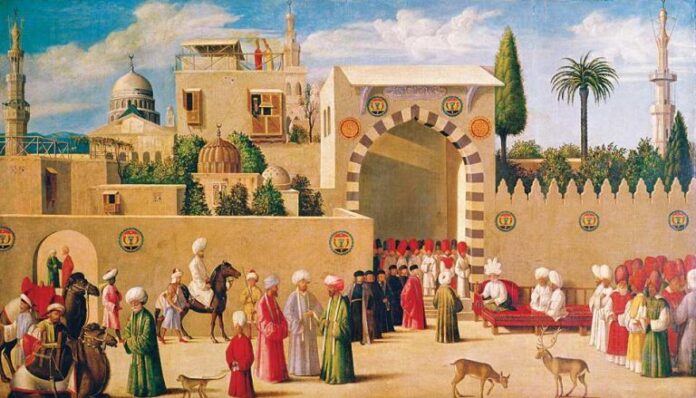History is a testament to the ever-shifting nature of human destiny. As time marches forward, so too do the fortunes of individuals and societies. The rise and fall of empires, the birth and death of ideologies, and the evolution of human thought all serve as reminders that the course of history is not set in stone.
—————–
The king, a dazzling figure, sat upon a magnificent throne, the center of everyone’s gaze. His crown, adorned with sparkling jewels, added to his majestic appearance. Noblemen and ministers, dressed in rich garments, bowed in respect. The hall was adorned with beautiful paintings and fine carpets, and the air was filled with a sweet fragrance. As foreign ambassadors presented their gifts, the moon shone brightly in the night sky, and the stars twinkled above.
The court of Amir Mu’awiyah was a very busy place. The ministers and officials were all busy with their work. People from the city had come to talk about their problems. There was a lot of noise and activity everywhere. The king had papers on a table in front of him. He was reading them and sometimes asking people to write notes on them.
A minister said to Amir Mu’awiyah, “Your Majesty, the commander Sabur, who has taken over Armenia, has sent his ambassador to you. And the emperor of the Byzantine Empire, Constantine, has also sent his ambassador to you. Both are asking for your help.
This is a story from the year 46 AH (after Hijrah, the Islamic calendar). A commander named Sabur had taken control of a part of Armenia, freeing it from the Byzantine Empire. There were often fights between Constantine and Sabur, but in the end, the Byzantine Empire was usually stronger. During the time of the Rashidun (Guided) Caliphate, the Muslims had started conquering parts of Armenia, but later on, there was a rebellion and they became independent. Then, in the year 73 AH (692 AD), Abd al-Malik ibn Marwan sent his brother to reconquer those lands.
Meanwhile, Amir Mu’awiyah had become the ruler of the Islamic Empire.
At that time, the Emperor Constantine of the Byzantine Empire sent his ambassador, Landra, and Commander Sabur sent his ambassador, Sergi, to the court of Amir Mu’awiyah. Sabur was asking Amir Mu’awiyah for help against Emperor Constantine, and Emperor Constantine was asking for help against Sabur.
Amir Mu’awiyah first allowed Sergi to come in, and then he allowed Landra to come in.
When Sergi saw Landra, he stood up to show respect. Seeing this, Amir Mu’awiyah scolded Sergi loudly, saying, “What are you doing? If this is how you behave, how would your master behave?
Sergi said apologetically, “Forgive me, Your Majesty. I was overcome by habit.
Amir Mu’awiyah asked Landra in a harsh tone, “Why have you come here?”
Landra replied, “Your Majesty, my king has sent me to ask you not to listen to this rebel. He is a traitor. And I am here on behalf of the king. You should not keep a rebel and a king in the same place, and you should not help him in any way.”
Showing off his power and importance, Amir Mu’awiyah replied, “Look, you are both my enemies. I will support whoever pays me the most tribute.”
Imagine a mighty empire, centuries old, seeking aid from a fledgling kingdom.
Hearing this, Landra left the court.
The next day, both of them were present again. But today, Sergi did not stand up to show respect to Landra, and he remained seated. Perhaps he had realized that they were both equals here.
The next day, Landra repeated his request.
Amir Mu’awiyah replied, “If you give us tribute from your entire kingdom, we will let you keep your kingdom. Otherwise, we will take that privilege away from you too.”
Landra was stunned by this reply. With great humility and worry, he said, “So you’re saying that you are the only powerful ones and we are now just like an illusion? Our God will help us.
Then, he asked for permission and left.
This event took place right at the beginning of the Umayyad period. The Umayyad period was a very important time in Islamic history. During this time, the Islamic empire reached its greatest size and power. The Umayyad kings, using their clever plans and strong armies, conquered many lands and created a huge Islamic empire.
You can imagine how powerful and important the Islamic empire was at this time by knowing that Islamic armies were spread out from Africa to South Asia and from Europe to Central Asia. The Umayyad capital, Damascus, was the biggest and most beautiful city in the world. The Umayyad rulers encouraged art, architecture, and culture, and they built amazing palaces, mosques, and gardens.
Science and literature also grew a lot during the Umayyad period. Muslim scientists made very important discoveries in math, astronomy, and medicine. Islamic culture from the Umayyad period also influenced other countries in Europe and Asia. The Umayyad Islamic empire was so powerful and grand that this time is called a great period in Islamic history.
(Book: A Brief History of the States – Chapter: Mu’awiyah ibn Abi Sufyan)
—————
Suhaib Nadvi
[Email: Laahoot.Media@gmail.com]
Laahoot Digest
Let’s connect on Social Media:
https://www.facebook.com/LaahootDigest
https://x.com/LaaHoot
https://www.youtube.com/@LaaHoot



